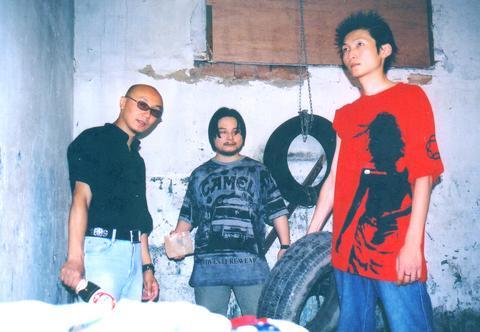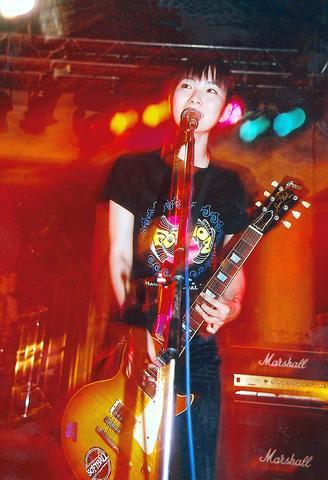Freddy Lin, head of the Taiwan Rock Alliance (TRA), is fond of saying that one doesn't need to be anti-China to be pro-Taiwan. But venting some spleen against China once a year at the Say Yes to Taiwan festival isn't entirely out of bounds either. And if a band actually from China is on hand, as Guangzhou-based punk trio Pangu (
Falling on the historically significant date of Feb. 28, the festival commemorates the 228 Incident of 1947. That incident has taken on powerful meaning, especially since the rise of the DPP, as an enormous wedge between the ethno-cultural entities described by the terms Mainlanders (外省人) and Taiwanese (本省人).
So, when China is evoked in raucous, expletive-filled choruses at the concert, the word refers to those jerks across the Strait pointing all those missiles our way as much as it does to the Chinese cultural nationalist ideology of no small number of KMT supporters.

PHOTO COURTESY OF TRA
"The KMT was the murderer behind the 228 Incident. They don't want Taiwanese people to remember that. They keep saying, `oh, we should forget the past and move on.' But the murderers have to admit to what they did and apologize before we can do that," Freddy said.
Over the past three years, Say Yes to Taiwan has been held in 228 Memorial Peace Park. This year, though, the venue for the show has been moved to the plaza in front of the Presidential Palace.
"We got that venue because the DPP supports our stance on the issue of 228, not because we [the TRA] support their stance on anything," Freddy said.

PHOTO COURTESY OF TRA
With such strong political undertones it's almost easy to forget about the powerful line-up of 14 bands that will be playing.
This year, groups will be converging on Taipei from Hong Kong, Japan, South Korea, the US, and all over Taiwan.
Headlining the show will be Akiakane, the new incarnation of Tokyo's cutesy girl punk band Softball. Softball played Say Yes to Taiwan for the past three years and last week Akiakane organized their own Say Yes to Taiwan festival in Tokyo, inviting Taipei indie rock band Nipples and Freddy Lin's band Chthonic (
In a break from years past, when the line-up was heavily tilted toward rock, this year includes Dog G (
But rock has been and remains the main draw of the show, with South Korea's hugely popular nu-metal band Nevada 51 and Liquid Gardens from the US, Akiakane and Pangu rounding out the foreign rock acts this year, with local bad boys LTK and a handful of other heavy-riffing bands representing the hometown.
Even if you don't care much for punk music, seeing Pangu play in front of the Presidential Office should be reason enough to come out for the show.

On April 26, The Lancet published a letter from two doctors at Taichung-based China Medical University Hospital (CMUH) warning that “Taiwan’s Health Care System is on the Brink of Collapse.” The authors said that “Years of policy inaction and mismanagement of resources have led to the National Health Insurance system operating under unsustainable conditions.” The pushback was immediate. Errors in the paper were quickly identified and publicized, to discredit the authors (the hospital apologized). CNA reported that CMUH said the letter described Taiwan in 2021 as having 62 nurses per 10,000 people, when the correct number was 78 nurses per 10,000

As we live longer, our risk of cognitive impairment is increasing. How can we delay the onset of symptoms? Do we have to give up every indulgence or can small changes make a difference? We asked neurologists for tips on how to keep our brains healthy for life. TAKE CARE OF YOUR HEALTH “All of the sensible things that apply to bodily health apply to brain health,” says Suzanne O’Sullivan, a consultant in neurology at the National Hospital for Neurology and Neurosurgery in London, and the author of The Age of Diagnosis. “When you’re 20, you can get away with absolute

May 5 to May 11 What started out as friction between Taiwanese students at Taichung First High School and a Japanese head cook escalated dramatically over the first two weeks of May 1927. It began on April 30 when the cook’s wife knew that lotus starch used in that night’s dinner had rat feces in it, but failed to inform staff until the meal was already prepared. The students believed that her silence was intentional, and filed a complaint. The school’s Japanese administrators sided with the cook’s family, dismissing the students as troublemakers and clamping down on their freedoms — with

As Donald Trump’s executive order in March led to the shuttering of Voice of America (VOA) — the global broadcaster whose roots date back to the fight against Nazi propaganda — he quickly attracted support from figures not used to aligning themselves with any US administration. Trump had ordered the US Agency for Global Media, the federal agency that funds VOA and other groups promoting independent journalism overseas, to be “eliminated to the maximum extent consistent with applicable law.” The decision suddenly halted programming in 49 languages to more than 425 million people. In Moscow, Margarita Simonyan, the hardline editor-in-chief of the